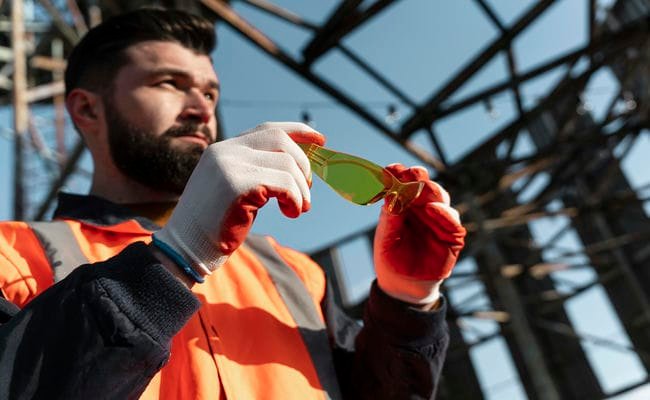In today’s rapidly evolving construction industry, materials matter more than ever. One material group that’s making waves is synthetic polymers. These versatile compounds are not just helping to build structures; they’re enhancing security and durability, ensuring that our buildings stand the test of time.
This blog will explore the significance of synthetic polymers in construction, the various types available, and how they contribute to creating safer, more reliable structures. Whether you’re a construction professional or someone interested in the latest building trends, read on to learn how synthetic polymers are shaping the future of construction.
Synthetic Polymers for Secure Construction Ventures

The Rise of Synthetic Polymers in Construction
Synthetic polymers have become indispensable in the construction sector due to their flexibility, strength, and cost-effectiveness. Unlike traditional materials, synthetic polymers can be engineered to meet specific needs, making them ideal for various applications.
Versatility and Adaptability
One of the main advantages of synthetic polymers is their versatility. They can be molded into different shapes and sizes, tailored to fit unique construction requirements. For instance, vinyl fencing installation in Richmond has become popular due to its customizability and durability.
Cost-Effective Solutions
Synthetic polymers often provide more affordable options compared to traditional materials like wood or metal. Their production costs are lower, and they require less maintenance, which translates into long-term savings for construction projects.
Enhanced Durability
These materials are designed to withstand harsh environmental conditions, thereby extending the lifespan of buildings. This durability makes synthetic polymers an excellent choice for structures exposed to extreme weather or heavy wear and tear.
Types of Synthetic Polymers Used in Construction
Various synthetic polymers are used in construction, each offering unique benefits that contribute to the overall strength and security of a building.
Polyethylene (PE)
Polyethylene is widely used for its high impact resistance and low moisture absorption. It’s commonly found in pipes, insulation, and plastic sheets, providing reliable performance in various applications.
Polyvinyl Chloride (PVC)
PVC is another popular polymer, known for its durability and resistance to environmental degradation. It’s used in everything from plumbing pipes to window frames, and even in vinyl fencing installation projects, offering a secure and lasting solution.
Polystyrene (PS)
Polystyrene is favored for its excellent insulation properties. It’s commonly used in building insulation, helping to maintain energy efficiency and reduce heating and cooling costs.
Polypropylene (PP)
Polypropylene is known for its chemical resistance and ability to withstand high temperatures. It’s used in roofing membranes, geotextile, and other construction elements requiring robust performance.
Applications of Synthetic Polymers in Construction
Synthetic polymers are utilized in various construction applications, each contributing to stronger, safer, and more efficient buildings.
Insulation and Coatings
Polymers like polystyrene and polyurethane are used extensively in insulation materials. They help maintain optimal indoor temperatures, reducing energy consumption and enhancing the building’s overall efficiency.
Plumbing and Electrical Systems
PVC pipes and fittings are a staple in modern plumbing and electrical systems. Their resistance to corrosion and ease of installation make them ideal for secure and long-lasting infrastructure.
Structural Components
High-strength polymers are used in load-bearing components, such as beams and panels. These materials offer superior strength-to-weight ratios, enabling the construction of lighter yet sturdier structures.
Surface Protection
Polymeric coatings are applied to surfaces to protect against environmental damage, chemical exposure, and wear. These coatings extend the lifespan of the materials they cover, ensuring long-term structural integrity.
Benefits of Synthetic Polymers for Secure Construction
The use of synthetic polymers in construction offers numerous benefits, enhancing the security and reliability of buildings.
Improved Safety
Polymers are engineered to meet stringent safety standards, reducing the risk of structural failure. Their resistance to fire, chemicals, and impact enhances the overall safety of the building.
Environmental Sustainability
Many synthetic polymers are recyclable, contributing to sustainable construction practices. Their use can reduce the environmental footprint of construction projects, aligning with green building initiatives.
Ease of Maintenance
Buildings constructed with synthetic polymers require less maintenance, as these materials are resistant to common issues like rust, rot, and pest infestations. This ease of maintenance translates into lower long-term costs and reduced downtime.
Design Flexibility
The versatility of polymers allows architects and engineers to explore innovative design solutions. This flexibility leads to more creative and functional buildings, meeting the evolving needs of modern society.
Future Trends in Polymer-Based Construction
The future of construction is set to be increasingly dominated by synthetic polymers, with ongoing research and development leading to new innovations.
Smart Polymers
Smart polymers that respond to environmental changes are being developed. These materials can self-repair, adapt to temperature fluctuations, and provide real-time data on structural integrity.
Biodegradable Polymers
Biodegradable polymers are gaining traction as a sustainable alternative to traditional materials. These environmentally friendly options promise to reduce waste and support green construction practices.
Advanced Manufacturing Techniques
Techniques such as 3D printing are revolutionizing the use of polymers in construction. These methods allow for precise, on-demand production of complex components, improving efficiency and reducing material waste.
Conclusion
Synthetic polymers are revolutionizing the construction industry, offering secure, durable, and cost-effective solutions. From enhancing the safety of buildings to supporting sustainable practices, these materials are paving the way for the future of construction. By incorporating synthetic polymers into your projects, you can ensure long-lasting, reliable structures that meet the demands of modern society.